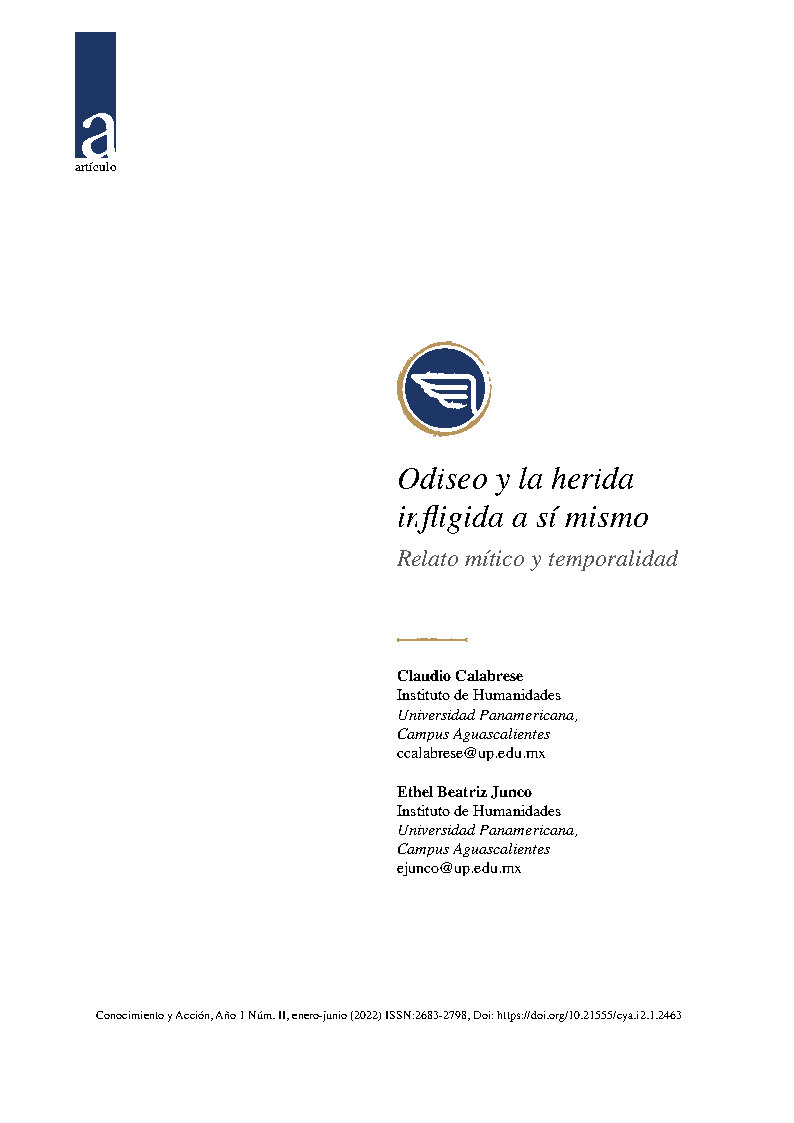Artículos

Publicado 08-01-2022
Palabras clave
- Odiseo,
- herida autoinfligida,
- Poseidón,
- Helena,
- Temporalidad mítica
Derechos de autor 2022 Conocimiento y Acción

Esta obra está bajo una licencia internacional Creative Commons Atribución-NoComercial-CompartirIgual 4.0.
Cómo citar
Calabrese, C., & Junco, E. . (2022). Odiseo y la herida infligida a sí mismo: Relato mítico y temporalidad. Conocimiento Y Acción, 2(1), 1-18. https://doi.org/10.21555/cya.i2.1.2463
Resumen
En nuestro trabajo, mostramos que la remembranza de Helena de la herida autoinfligida de Odiseo nos sitúa en un presente eterno, emergiendo "desde" y desapareciendo "en" la naturaleza del hexámetro homérico, et retour, para crear y recrear espacios semánticos que hacen posible el retorno del héroe y la acción heroica, lo que dota a la correlación temporal de un significado inesperado a través de la correspondencia pasado-futuro / futuro-pasado.
Referencias
- Atienza, Alicia María. <>, Circe No. 13 (2009): 51-64.
- Auerbach, Erich. Mimesis. Dargestellte Wirklichkeit in der abendländischen Literatur. Tübingen: Francke, 1949.
- Bailly, Anatole. Dictionnaire Grec – Français. Paris : Hachette, 1963.
- Beck, Deborah Speech Presentation in Homeric Epic. Austin: University of Texas Press, 2012.
- Bravo, Benedetto. <>, QUCC vol. 67 no.1 (2001): 49-114.
- Calabrese, Claudio. El símbolo del viaje en La Odisea y en La Eneida. Barcelona: Prohoms, 2007.
- Chantraine, Pierre. Dictionnaire Étymologique de la Langue Grecque. Histoires des Mots. Paris : Klincksieck, 1999.
- Clader, Linda Lee. Helen. The Evolution from Divine to Heroic in Greek Epic Tradition. Leiden: Cambridge University Press, 1976.
- Currie, Bruno. Homer’s Allusive Art. Oxford: Oxford University Press, 2016.
- Delebecque, Edouard. Construction de l’Odyssée. Paris : L'Antiquité Classique, 1980.
- Di Benedetto, Vincenzo. <>. Prometheus no. 25 (1999): 193-225
- Duichin, Marxo. <>, RCCM, vol.55 no.2 (2013): 267-297.
- Fenik, Bernard. Studies in the Odyssey Wiesbaden: Steiner, 1974.
- Foley, John Miles. Immanent art: From Structure to Meaning in Traditional Oral Epic. Indianapolis: Indiana University Press, 1991.
- Fränkel, Hermann. <>, en Wege und Formen frühgriechischen Denkens, ed. por Franz Tietze, 1-22. München: Beck, 1953.
- Friedrich, Rainer. <>, Journal of Hellenic Studies, Vol. 111 (1991), 16-28.
- Galhac, Sylvie. <> en Penser et représenter le corps dans l’antiquité, ed, por Francis Prost y Jérôme Wilgaux, 15-30. Rennes: Presses universitaires de Rennes, 2004.
- Heubeck, Alfred, Stephanie West y J. B. Hainsworth. A Commentary on Homer's Odyssey, vol. I: Introduction and Books i–viii. Oxford: Clarendon, 1988.
- Lentini, Giuseppe. <>, Gaia, no. 18 (2015), 375-385.
- Louden, Bruce. The Odyssey. Structure, Narration and Meaning. Baltimore: Johns Hopkins University Press, 1999.
- MacGlone, Matthew y Jennifer. L. Harding, <>, Journal of Experimental Psychology: Learning, Memory and Cognition, no. 24 (1998), 1211-1223.
- Meillet, Antoine y Joseph Vendryes, Traite de Grammaire Comparée des langues classiques, Paris : Librairie Ancienne Honoré Champion, 1948.
- Mathieu, Jean- Marie. <>, Kentron. Revue pluridisciplinaire du monde antique, no. 20 (2004), 15-45.
- http://journals.openedition.org/kentron/1820
- Murnaghan, Sheila. Disguise and Recognition in the Odyssey. New York: Lexington Books, 2011.
- Nagler, Michael. The Proem and the Problem, «CLAnt» 9, 1990, 335-356.
- Nestle, Walter. <>, Hermes, no. 77 (1942), 46-77.
- Plutarch. Quaestiones convivales. Moralia. Vol. VIII and IX, Cambridge – London, 1961-1969, with an English translation by Edwin L. Minar (Books VII-VIII).
- Reinhardt, Karl. <>, en Von Werken und Formen. Vorträge und Aufsätze, (Godesberg: H. Küper, 1948), 52-162.
- Scodel, Ruth. Listening to Homer. Tradition, Narrative and Audience. Ann Arbor: University of Michigan Press, 2009.
- Stanford, W.B. <>, CPh no. 47 (1952), 209-213.
- Stockdale, Elizabeth. <> en Paths of knowledge. interconnection(s) between knowledge and journey in the Greco-Roman world, ed. por Chiara Ferella y Cilliers Breytenbach, 19-33. Berlin: Topoi, 2018.
- Walsh, Thomas. R. <>, Mnemosyne no. 48, (1995), 385-410.
- Zanker, Andreas T. Metaphor in Homer. Time, Speech, and Thought. Cambridge: Cambridge University Press, 2019.

